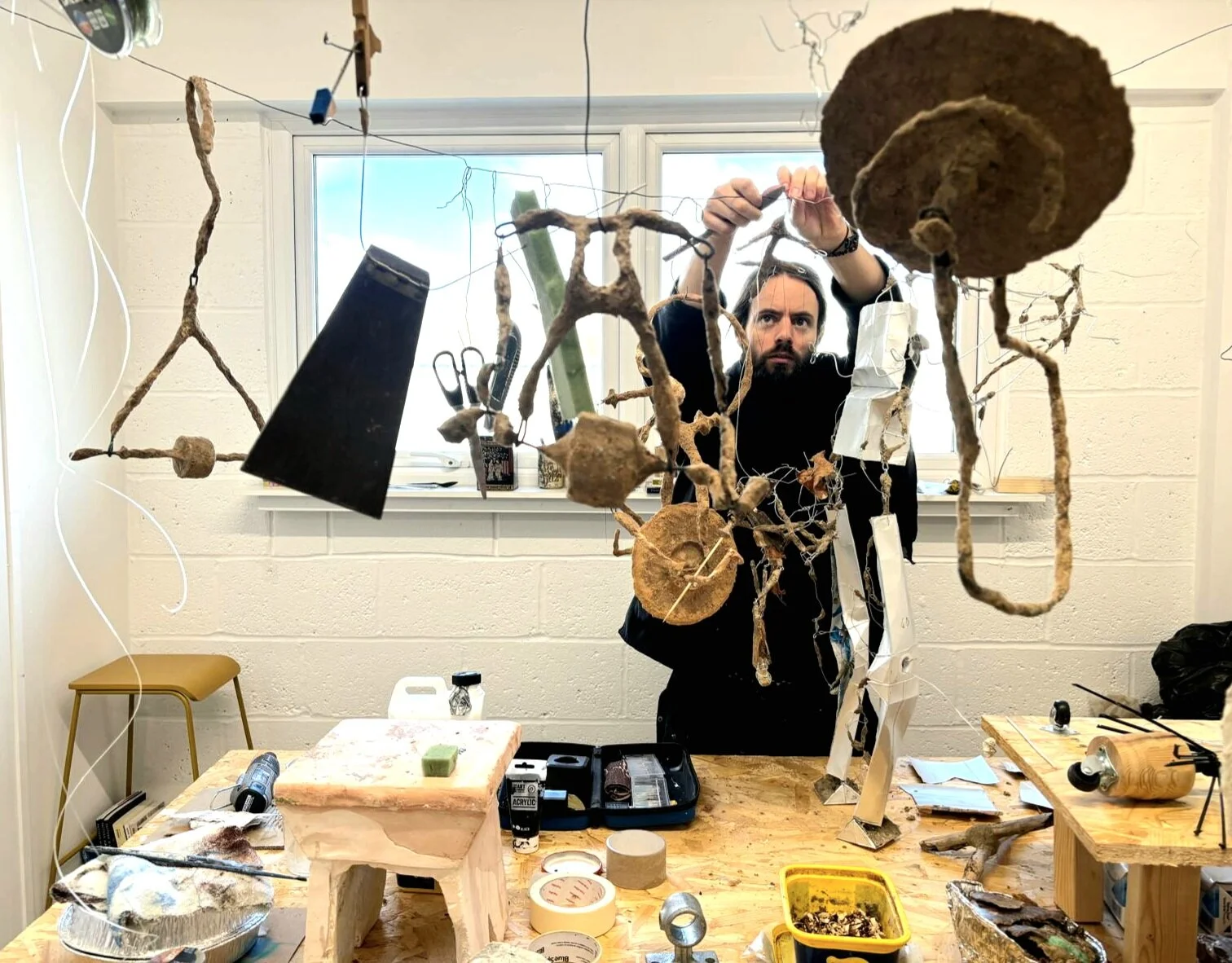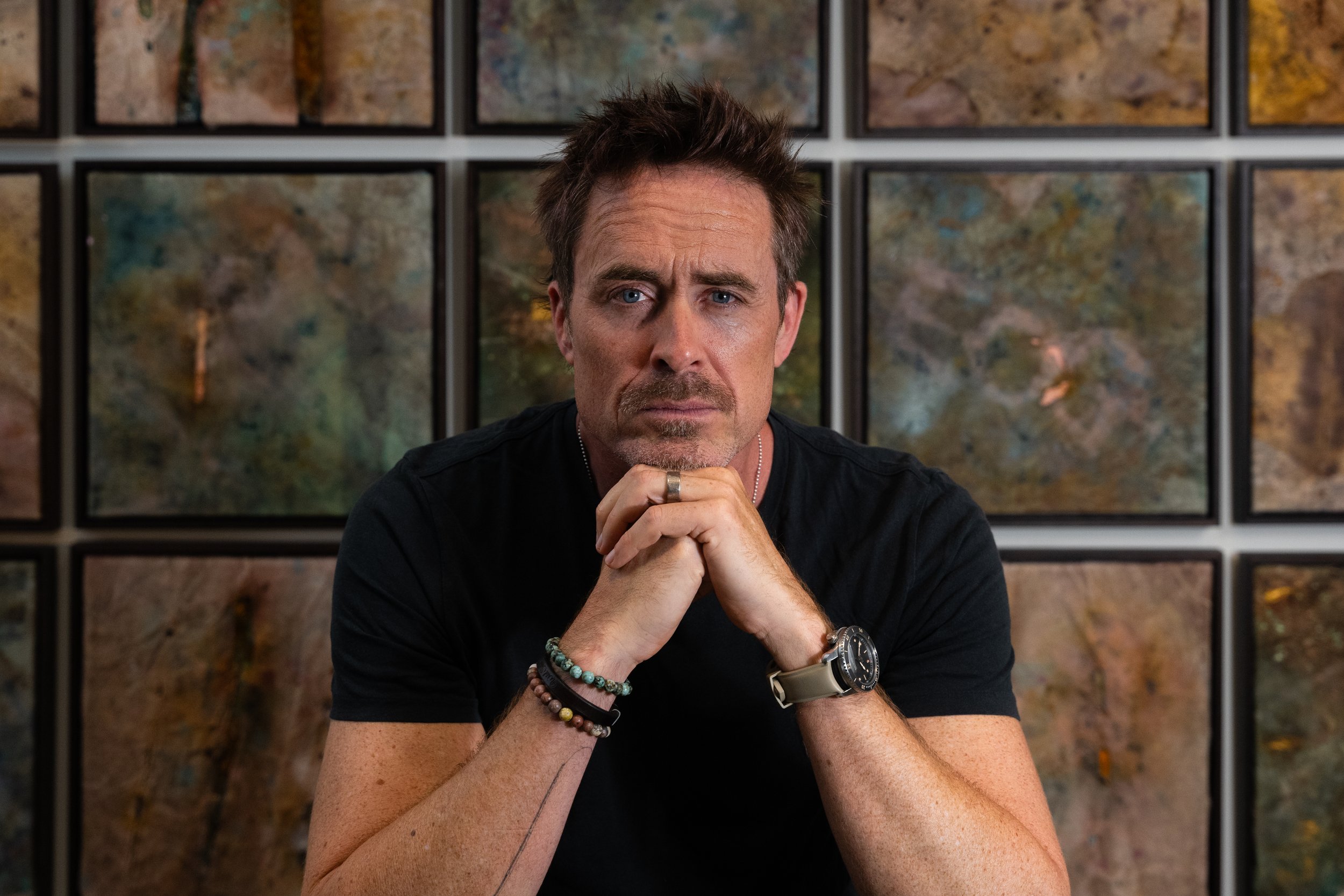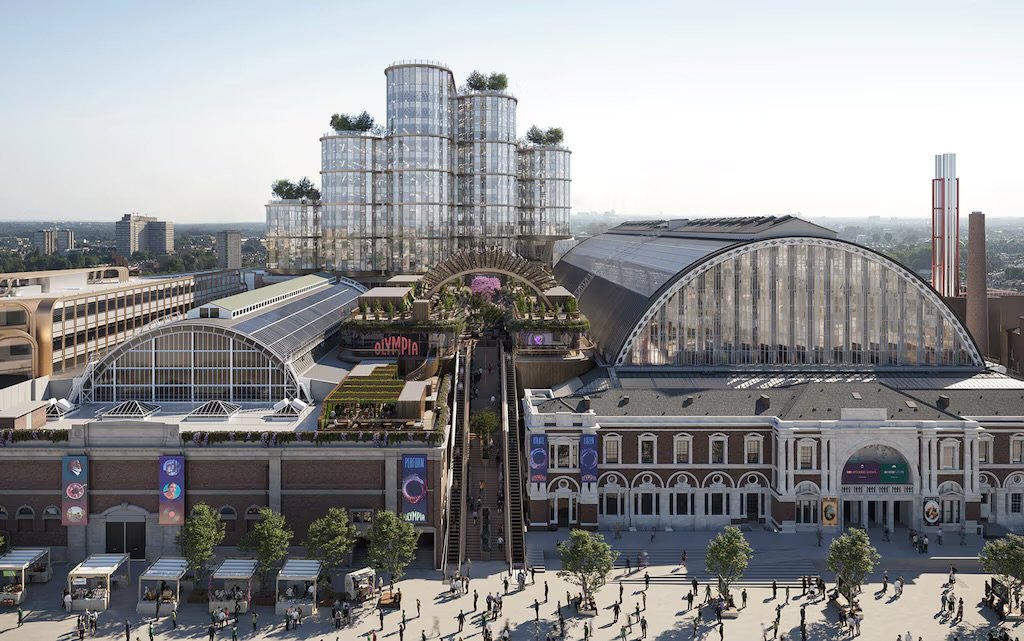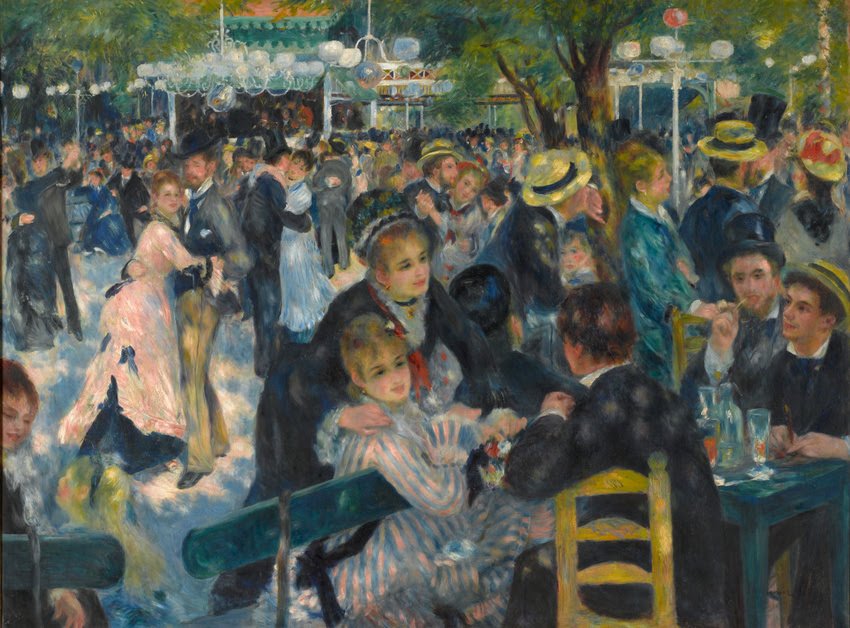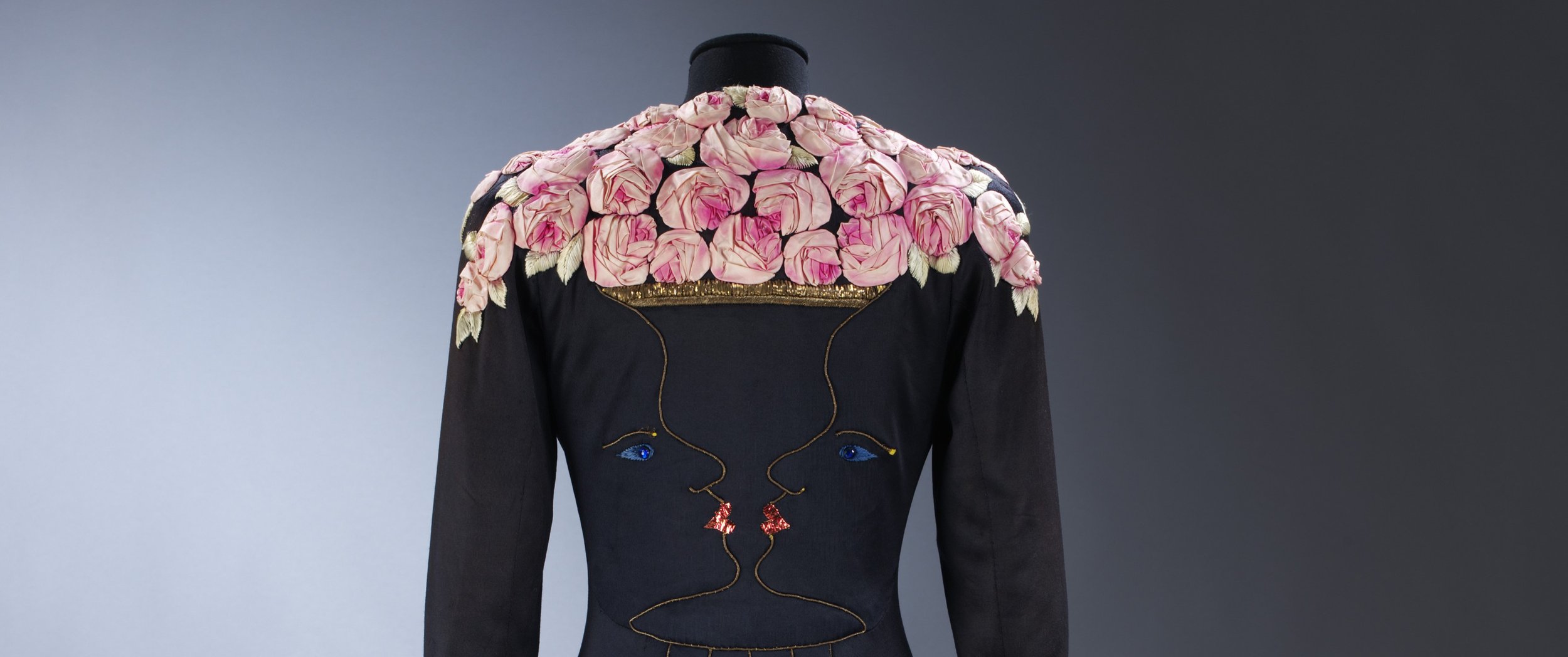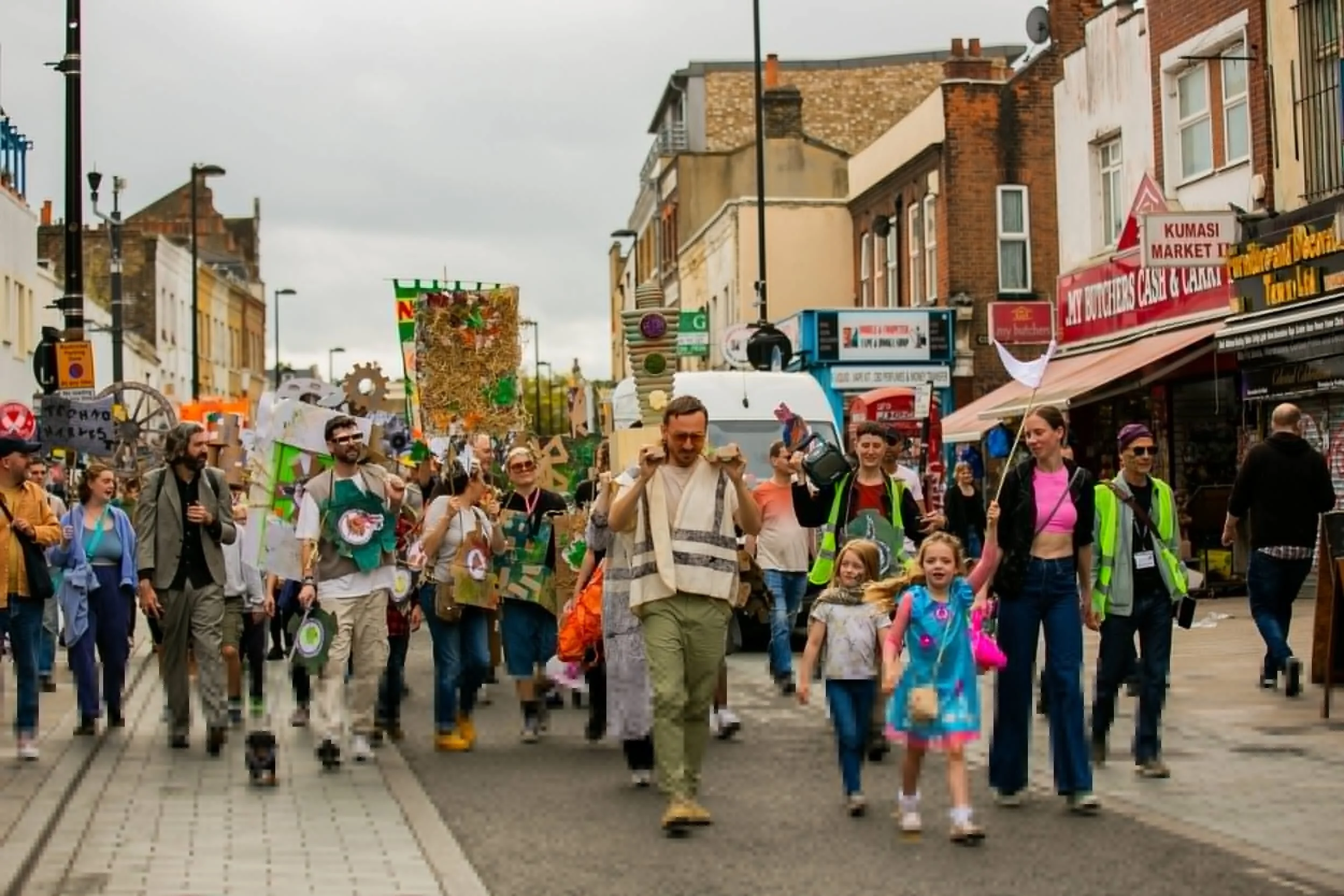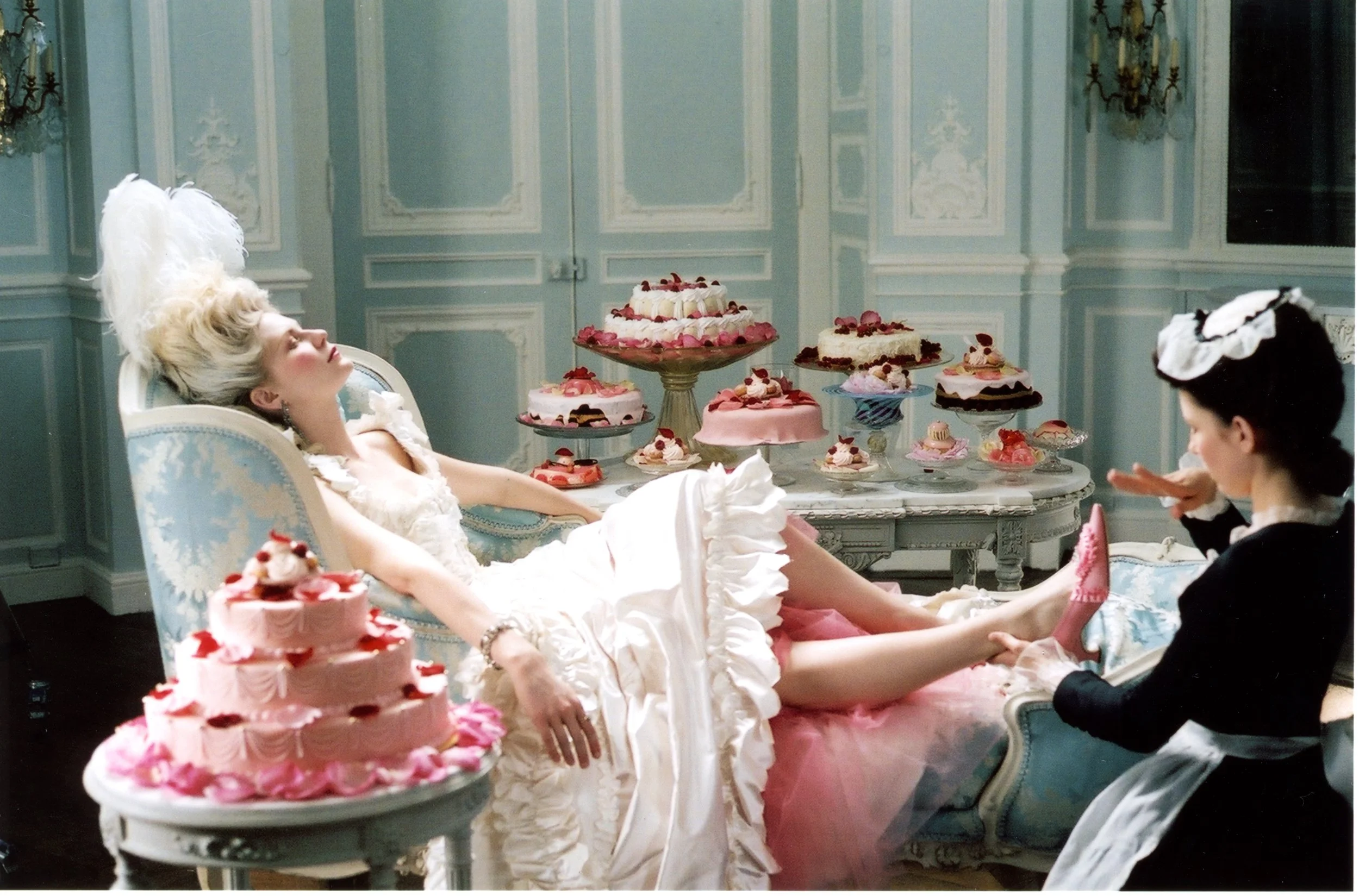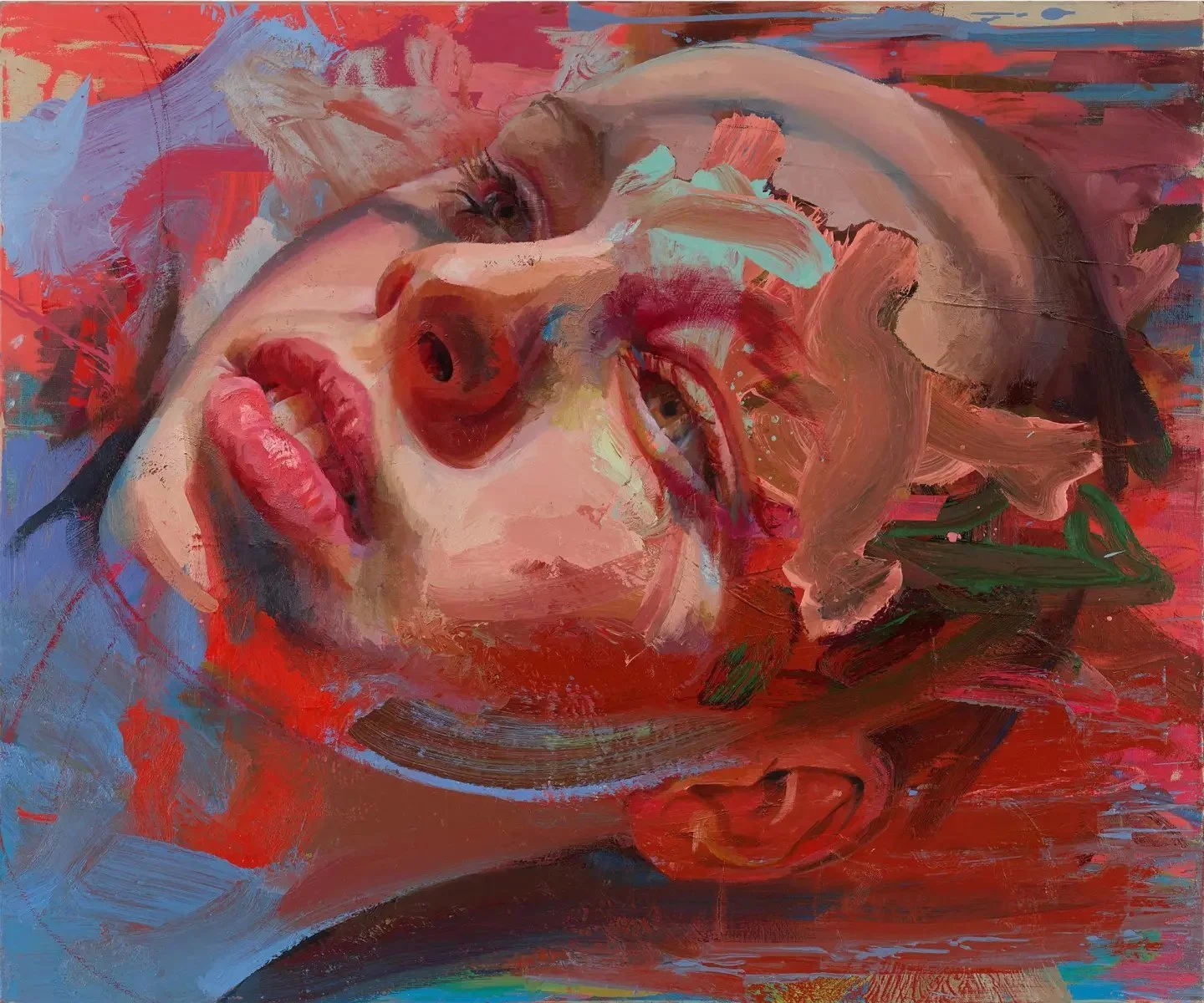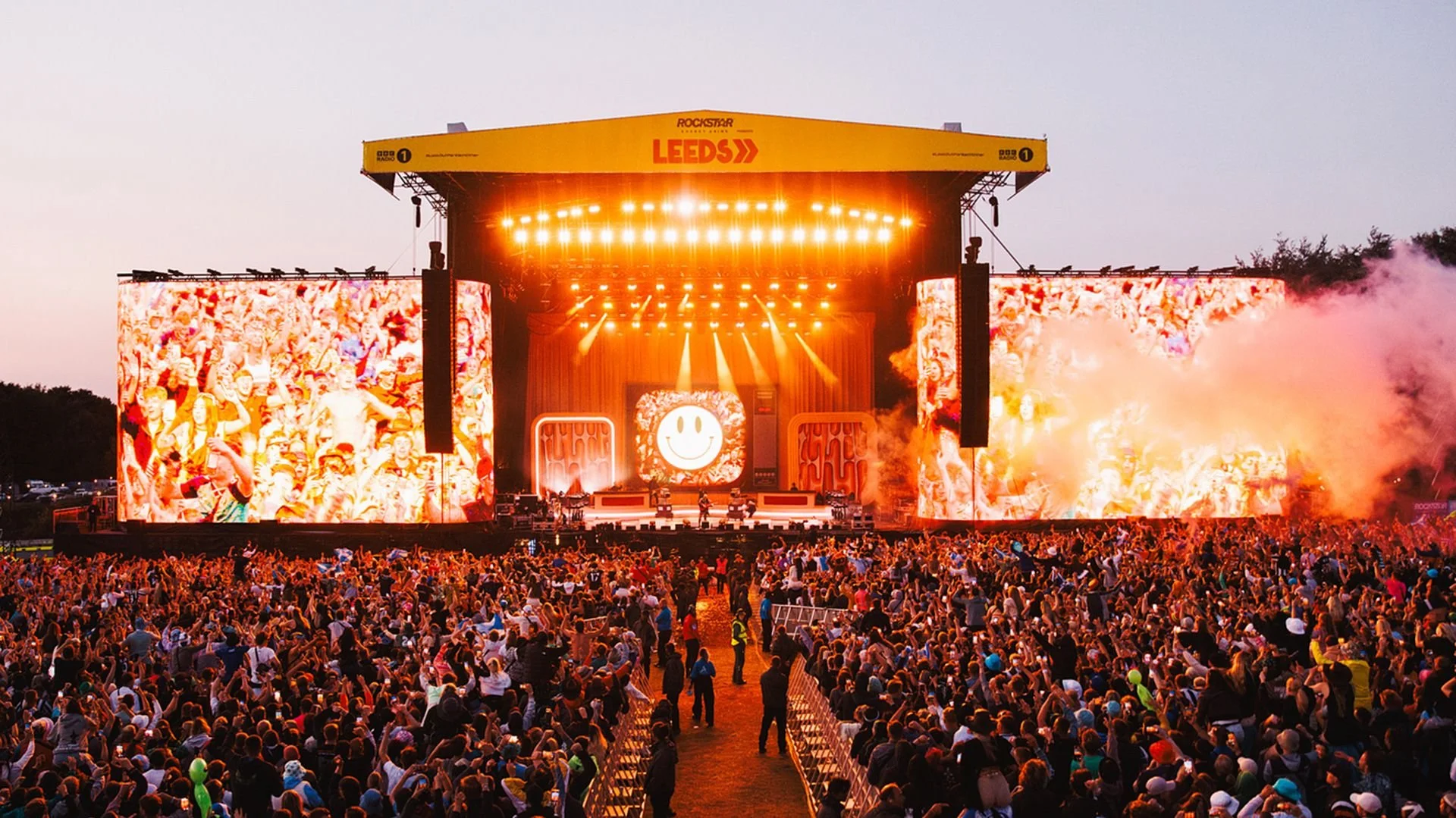In conversation with Anthony Daley
“Van Gogh once said that one day painting would just be about colour, and I love that, and think that’s about freedom. It’s the freedom to explore and go into the unknown, and I like to think my paintings have that sense of play.”
- Anthony Daley

Anthony Daley. Photo by James Marshall © JMinventive (jminventive.co.uk).
The works of abstract expressionist painter Anthony Daley explore the language of beauty in vibrant and explosive hues of colour punctuated with iridescent flashes of light. His oversize works represent something of a time portal, creating a unique bridge between the Old Masters and the contemporary sphere, drawinginspiration from a diverse array of sources, ranging from classical literature, quantum physics and modern poetry to natural phenomena. He feeds all of these influences into vast canvases that evoke the sublime, where mesmeric explorations in colour transport the viewer to contemplation of the infinite. His upcoming show, presented by Varvara Roza and Blender Gallery, provides something of an epilogue to his previous successful show Son of Rubens at Dulwich Picture Gallery, in which he responded to paintings of the iconic Flemish artist, and its title Irreality refers to the vagaries of reverie and transcendence. Here, the artist talks to FloLondon about communicating with the ghosts of art history, recalls his early childhood in Jamaica, and tells us why all of his paintings contain a kernel of unrequited love.
What, ultimately, do you think is the purpose of art?
The purpose of art? Oh, God. It's a celebration. It's a revelation. It's a joy. It's a muckraking celebration of humanity. It's who we are. It's play, essentially, but play is one of our most amazing tools of invention. I learned that connection between playing and invention quite early on as a four-year-old, and that connection between truth and beauty. Van Gogh once said that one day painting would just be about colour, and I love that, and think that’s about freedom. It’s the freedom to explore and go into the unknown, and I like to think my paintings have that sense of play.

Are there any times when you feel overwhelmed by your painting process – where it takes over, in a sense, rather than you guiding it?
At some stage the painting will start to paint you. It will take over. And that's an incredible moment, when the work starts speaking back. In those moments, I think, who am I speaking to, am I speaking to Rembrandt? Am I speaking to Einstein? Am I speaking to God? At that point, it's not your painting, and you are speaking to the infinite. I sometimes feel a bit angry with myself for not being a theoretical physicist, but that is a different world, and an extraordinary one. Those people are truth-speakers and interpreters of reality, and they interpret it in such an amazing way from nothing, from just a few vibrations. I hope I am not overegging what I do, but I'd like to think there is some connectivity there in my painting, in terms of playing with reality and truth, and, ultimately, beauty. When I'm painting, it's like I am speaking to the God of painting, or some kind of mythical being. It's like there are two of us, and one of us is directing me to get the next colour out.
Are these things tied to a notion of happiness for you? Was art always a form of escape?
Yeah. I mean, I didn't know as a child in Jamaica that you had to have friends. I wasn't interested. I was more interested in reading and learning, and living with the dead men, you know? All of the geniuses. From a very young age, I always had a fascination with all the geniuses in the world – not just painters, but philosophers, and scientists – and the one that fascinated me more than anybody else was Isaac Newton. As a child, I was like a little Newton in my mind, and I was constantly making little experiments. My grandmother had stuck ideas in my head about Eton and Oxbridge, so educational attainment was always the drive. I was seven-and-a-half when she died, but my mantra to myself remained ‘what do I think they would do at Eton?’ So, I made sure I learned music; I made sure I learned art; I tried to teach myself Latin. I made sure I learned everything. I tried to do all that kind of stuff just to make sure that I would survive. That's all I was interested in in Jamaica. I just had the will to learn, and I was fascinated with patterns. I used to love all the patterns. I loved the pattern of writing and poetry, and the power of poetry to express massive concepts with minimal use of language. Everyone thought I was a dreamer.
Did some of your escape into solitary creativity come from being left with your grandparents in Jamaica?
Yeah. And some people were cruel to me in Jamaica. My first set of grandparents – my dad's parents, who I lived with till I was seven-and-a-half years old – were ideal beyond the imagination. They were beautiful, intelligent, highly educated, perfect people. When they died, though, I made the trip across Jamaica to my other grandparents, and it was basically like, Welcome To Hell. The abuse and cruelty was beyond. They took all our money, and everything, and they didn't let us go to school. We became domestic slaves, and, at the same time, I was educating them too. I was teaching them to read and write. It was so hard, because literally every day they would make me go and find money for them, and almost every day I would stand outside of school and cry and rattle the railings, and wish I was in there.
Wow. Art was genuinely a portal to a better world I imagine ...
Yeah. And, luckily, our garden was all clay, so I could make clay sculptures. As soon as I was free from whatever they had been putting me through that day, I would make art, or try to learn something. I used to see it as a Cinderella story, because that had been one of my favourite stories as a child in my first family. My dad's parents had been all about storytelling and reading stories to me. And we were all obsessed with singing, and making up songs around Cinderella. And I'd always be dressed like the little prince who marries Cinderella, in my mind. Then, when I crossed the Rubicon to go and live with my other set of grandparents they tried to knock it out of me, and I became Cinderella, the slave. I had to work day night for them. I was the breadwinner at eight years old. And if I didn't bring back the stuff, I was literally beaten black and blue. But then, at one stage, when I was nearly coming over to live in England with my parents, we went to see one of my grandmother’s sisters in Kingston. She looked at me and said, you know, this boy is special and if you don't get him to school, I'm going to call the police on you. My grandparents then sent me to school for the last six months before I came to England, because of the threat of the police. When I came to England, things got a little bit more normal, because I started school properly.

How was that transition for you?
I was quite embarrassed by my obsessions with science and art when I arrived at secondary school in Leeds, so I just slotted into ordinariness as much as I could to get by. I tried to fit in. I learned to play football. The first thing I noticed was the sadness of the boys in my school. It was last year of an old school, which was an all-boys school, at the time, and the year below was mixed. All of these pupils had just all failed their 11+ and I remember thinking, I was glad I didn't have to take it, because all the boys in my year group had a shadow hanging over of them. But I also remember thinking that these people were really amazing. I'm actually deeply embarrassed by my educational attainment, though, because I always really did want to be an Einstein or a Newton. These people were my family in Jamaica, and they always remained my imaginary friends, in a sense.
Was Rubens one of those people you adopted into your imaginary family?
I do remember deciding at one stage as a kid that Rubens would be my father or teacher. Most of the paintings in Irreality are from my show at The Dulwich Picture Gallery, which was based on responding to Rubens, and, for me, it was almost a bit like a school project. It was distracting from my normal body of work, but it was an opportunity to revel, play and to have fun, and connect more closely with Rubens. I used to live quite near the Dulwich Picture Gallery in the early 80s, and I used to go there every couple weeks. I was always drawn to the painting Venus, Mars and Cupid, which has got a naughty edge to it, in lots of ways. I actually wanted to work with it in the 80s, when I had just finished art school. But I didn’t want to work with figurative paintings for a while, so I thought I'd leave it till later in life.
Incredible then that the opportunity came?
Yeah. When the opportunity to came along to work with the Dulwich Picture Gallery, I had an option to work with that painting. So, I kind of made peace with it, and I just thought, I'll have a play with paint and drawing loosely. Anyway, at the end of the day, the work was up on the wall, and then I had to confront it. Then I had to ask myself do I just leave it behind, or do I carry it forward? I'm always about two years behind my painting in terms of what I am going to paint, or what I want to paint. I don't know if the paintings in the Dulwich show were successful paintings. I can't say that. I still haven't got to that stage. But the paintings exist, and it’s now about what people want to get from them. I don't know. I just thought they can enjoy them, or be confronted by them, or, you know, they can have an argument with them.
What's the most profound response you've had to a piece of work?
It is really about if somebody understands the work, because art is a communication tool, isn't it? It's a vehicle or a portal between me and the other person, and I'm always amazed that somebody would even want to look at a painting. Especially a painting I've done. I'm always full of gratitude when I see people looking at the work, and sometimes preparing to buy the work and take it home. I will never really truly understand that, but I'm full of gratitude and love for that person, because they're buying love, you know? My paintings are always somehow about unrequited love and then somebody actually loving them. It's universal love.
‘Irreality’ by Anthony Daley opens at Varvara Roza Galleries (8 Duke Street, St. James’s, London, SW1Y 6BN) from 12 November - 5 December 2024.
Instagram: @anthonydaleyart
Website: tonydaley.co.uk
Interview by John-Paul Pryor
Judith Clark is a curator and fashion exhibition-maker, and currently Professor of Fashion and Museology at the University of the Arts London. She lectures on the MA Fashion Curation and is a founding Director of the Centre for Fashion Curation. From 1997 to 2002, she ran London’s first experimental fashion gallery in Notting Hill…
Lindokuhle Sobekwa is a South African photographer from Katlehong, Johannesburg. Since his first exhibition in 2013, his work on social issues and personal histories—like his photo essay Nyaope—has gained international recognition. A member of Magnum Photos, Sobekwa was recently awarded the 2025 Deutsche Börse Photography Foundation Prize for his project I carry Her Photo with Me…
Sol Bailey Barker is a multidisciplinary artist whose work explores the connections between ecology, mythology, and speculative futures. Through sculpture, sound, and installations, they blend ancient knowledge with emerging technologies to examine humanity’s relationship with the natural world…
Hanna Salomonsson is a London based Swedish ceramic artist. Following a career in landscape architecture, she re-trained in ceramics in 2018. She also holds a BA in Art History, and this combined with her landscape grounding provides a unique vantage point for her ceramic practice…
Lewis Walker is a London-born queer, non-binary movement artist. A former Great Britain gymnast and Acrobatic Gymnastics World Champion, they trained from age 6 to 21 before earning a degree in Contemporary Dance. Their work spans theatre, film, fashion, music, and the commercial sector. Walker continues to choreograph gymnastics competition routines for the Great Britain, Italian and French national teams…
Daniel is a curator-producer dedicated to the social impact of the arts and cross-sector collaboration. He is currently Creative Director & Chief Executive of Old Diorama Arts Centre (ODAC) in Euston, where he has strengthened the centre’s community connections amidst urban transformation…
Peter Bellerby is the founder of Bellerby & Co. Globemakers, a company renowned for its exquisite hand-crafted globes. Established in 2010, the company specialises in meticulously designed pieces that showcase exceptional craftsmanship, positioning Bellerby & Co. as a leader in the globe-making industry…
Gabriele Beveridge is known for her sculptural and conceptual practice that combines materials as diverse as hand-blown glass, photo chemicals, and found images…
Robyn Orlin is a South African dancer and choreographer born in Johannesburg. Nicknamed in South Africa "a permanent irritation", she is well known for reflecting the difficult and complex realities in her country. Robyn integrates different media into her work (text, video, plastic arts) to she investigates a certain theatrical reality which has enabled her to find her unique choreographic vocabulary…
Katrina Palmer, an artist known for exploring materiality, absence, and dislocation, recently spoke to us following her year-long residency at the National Gallery about her exhibition The Touch Report…
Enej Gala is an artist who splits his time primarily between London and his hometown of Nova Gorica, Slovenia. A graduate of the Academy of Fine Arts in Venice and the Royal Academy Schools (2023), Gala first gained our attention with Neighbour’s Harvest, an installation that cleverly combined puppetry and conceptual art…
David Ottone is a Founding Member of Award-winning Spanish theatre company Yllana and has been the Artistic Director of the company since 1991. David has created and directed many theatrical productions which have been seen by more than two million spectators across 44 countries…
Darren Appiagyei is a London-based woodturner whose practice embraces the intrinsic beauty of wood, including its knots, cracks, bark, and grain. Highly inspired by Ghanaian wood carving, Darren explores raw textures and new woods in his work…
Huimin Zhang is an artist specialising in 22K gold, known for her innovative craftsmanship. She combines various cultural techniques, including filigree, engraving, and European gold and silver thread embroidery, to create unique works…
Akinola Davies Jr. is a BAFTA-nominated British-Nigerian filmmaker, artist, and storyteller whose work explores identity, community, and cultural heritage. Straddling both West Africa and the UK, his films examine the impact of colonial history while championing indigenous narratives. As part of the global diaspora, he seeks to highlight the often overlooked stories of Black life across these two worlds.
Hannah Drakeford is a London-based interior designer known for her bold and colourful interiors. She transitioned from a 21-year retail design career to interior design, and has gained popularity on social media where she now shares creative upcycling tutorials and encourages individuality in home decor…
Shula Carter is an East London-based creative with a background in contemporary, ballet, and modern dance. She trained at the Vestry School of Dance and later at LMA London, where she developed skills in commercial, hip hop, and tap dance, alongside stage and screen performance…
Dian Joy is a British-Nigerian interdisciplinary artist whose work delves into the intersections of identity, digital culture, and the fluid boundaries between truth and fiction. Her practice is rooted in examining how narratives evolve and shape perceptions, particularly in the digital age.
Dian Joy is a British-Nigerian interdisciplinary artist whose work delves into the intersections of identity, digital culture, and the fluid boundaries between truth and fiction. Her practice is rooted in examining how narratives evolve and shape perceptions, particularly in the digital age.
John-Paul Pryor is a prominent figure in London’s creative scene, known for his work as an arts writer, creative director, editor, and songwriter for the acclaimed art-rock band The Sirens of Titan…
Jim Murray is an actor, director, conservationist and artist known for Masters of Air (2024) and The Crown (2016). Murray first came to prominence as an artist in 2023 with his acclaimed inaugural exhibition In Flow, where his dynamic abstract paintings were hung in conversation with John Constable’s The Dark Sid…
Anthony Daley is an abstract expressionist painter known for his vibrant, large-scale works that explore beauty through intense colour and light. His art bridges the past and present, drawing inspiration from the Old Masters as well as diverse sources like literature, science, poetry, and nature.
Rachel Kneebone’s work explores the relationship between the body and states of being such as movement, stasis, and renewal. Through her porcelain sculptures, she examines transformation and metamorphosis, reflecting on what it means to inhabit the body and be alive…
Saff Williams is the Curatorial Director at Brookfield Properties, bringing over fifteen years of experience in the arts sector…
Sam Borkson and Arturo Sandoval III, the acclaimed LA-based artists behind the renowned collective "FriendsWithYou," are the creative minds behind "Little Cloud World," now on display in Covent Garden. During their recent visit to London, we had the privilege of speaking with them about their creative process and the inspiration behind this captivating project.
Kinnari Saraiya is a London-based Indian artist, curator, and researcher whose work focuses on trans-altern and post-humanist ideas from the Global South. She is currently a curator at Somerset House and has held positions at the Baltic Centre for Contemporary Art, Frieze Art Fair, and Bowes Museum....
Fusing her Asian roots with a fascination for African pattern work and her deep passion for architectural geometry, Halima’s work is intense yet playful, structured yet creative; substantial yet dynamic and invariably compelling in its originality.
Matilda Liu is an independent curator and collector based in London, with a collection focusing on Chinese contemporary art in conversation with international emerging artists. Having curated exhibitions for various contemporary art galleries and organisations, she is now launching her own curatorial initiative, Meeting Point Projects.
EKLEIDO, a choreographic duo formed by Hannah Ekholm and Faye Stoeser, choreograph performances for live shows and film.
Lydia Smith is one to watch. Currently on show in three different places across London, her work can be seen in a solo exhibition in the City, a group show in a chapel in Chelsea and through a new series of monumental sculptures installed outdoors across sprawling parkland…

Following the success of its landmark tenth anniversary, Photo London is poised to embark on a transformative new chapter in 2026 by relocating to the historic National Hall at Olympia, Kensington. ..
In autumn 2026, the National Gallery will open Renoir and Love, a landmark exhibition exploring the romantic and social dimensions of Pierre-Auguste Renoir’s art. With over 50 masterworks on display, this will be the most significant UK exhibition of the French Impressionist’s work in two decades…
In 2026, the V&A Museum will present Schiaparelli: Fashion Becomes Art, the first major exhibition in the UK focused on Italian designer Elsa Schiaparelli. Opening at the Sainsbury Gallery in March, the exhibition will trace the development of the House of Schiaparelli from the 1920s to its recent revival under current creative director Daniel Roseberry….
La Terrasse by GREY GOOSE is now open at Rosewood London, inviting guests into an elegant summer escape in the heart of the city. Set within the hotel’s grand Belle Époque style courtyard, this alfresco haven is inspired by the charm of the French Riviera…
This week in London (7–13 July 2025) offers a spectacular mix of entertainment, from pop-up concerts and underground club nights to festivals, art, theatre, opera, exhibitions, outdoor cinema, and community-focused events…
Vienna, the Austrian capital, is home to a wealth of incredible art institutions, making it an essential destination for art lovers this summer 2025. With its close proximity to London, the city offers a captivating mix of exhibitions ranging from historic institutions like the Albertina and Belvedere museums, showcasing classical masters, to contemporary spaces including Kunsthalle Wien, Belvedere 21…
Autumn is always a busy time for art in London, with Frieze Week in October drawing international attention. But beyond the fairs, the city’s museums and galleries are offering a strong line-up of exhibitions worth seeing. From the V&A’s exploration of Marie Antoinette Styleto Tate Modern’s major survey of Nigerian Modernism, there is much to engage with. Dirty Looks at the Barbican…
With shows ranging from historical military art to queer talismans, pop protest, and the power of drawing, here is our guide to the art exhibitions to see in London in July 2025…
Edward Burra described painting as a ‘sort of drug’, a tonic to the rheumatoid arthritis that plagued his daily existence. Under its influence, he became one of the great observers of the twentieth century, creating vivid and surreal scenes that captured a rapidly changing society. The latest exhibition of Burra’s work at the Tate Britain…
This week, the Hayward Gallery has opened the touring exhibition of Yoshitomo Nara, expanding on the blockbuster shows previously held at the Guggenheim Museum Bilbao and the Museum Frieder Burda in Baden-Baden. The exhibition includes both early and more recent sculptures, with some works created as recently as last year…
What’s on in London this week (16–22 June): A vibrant round-up of London’s best art, theatre, music, food, and free events—plus the return of the Royal Academy’s Summer Exhibition and a seafood hotspot opening in Shoreditch…
This summer, Bozar presents a compelling trio of exhibitions that pose urgent questions about who we are, how we see one another, and what we carry — both within and across cultures. From When We See Us, a sweeping survey of Black figuration across the last century, to Berlinde De Bruyckere’s haunting sculptural works in Khorós, and Familiar Strangers, which reflects on shifting identities in Eastern Europe…
July is one of the best times to be in London, with a wide range of events taking place across the city. Catch world-class tennis at Wimbledon, dance into the night at Wireless Festival or BST Hyde Park, and enjoy open-air cinema with skyline views…
This week in London will see the return of the HSBC Women’s Tennis Championships at Queen’s Club, the opening of Yoshitomo Nara at the Hayward Gallery, Eel Pie Island Open Studios, and LIDO Festival in Victoria Park…
A guide to art exhibitions to see in Brussels this summer, from Baucher and Feron’s Art Deco interiors to When We See Us, a landmark show on Black figurative painting curated by the late Koyo Kouoh, and Looking Through Objects, a compelling survey of contemporary Polish women designers…
London is set to serve up an extraordinary tennis season in 2025, offering fans an exciting mix of elite competitions across some of the city’s most iconic venues. From the historic grass courts of The Queen’s Club and the All England Lawn Tennis Club to the exclusive courts of the Hurlingham Club, tennis enthusiasts can look forward to a thrilling lineup of…
What’s on in London this week? From the London Design Biennale and Serpentine Pavilion to WOW!house at Chelsea Harbour and London Open Gardens — discover the city’s top exhibitions, performances, and cultural highlights…
Meltdown Festival 2025 – Curated by Little Simz · London Design Biennale 2025 · Royal Academy of Arts – Summer Exhibition 2025 · London Festival of Architecture 2025 · London Open Gardens 2025 · Serpentine Pavilion 2025 – Marina Tabassum: A Capsule in Time · London Gallery Weekend 2025 · Camberwell Arts Festival 2025 – ‘Free For All’ · ICA – Connecting Thin Black Lines: 1985–2025 · Saturday Sketch Club – Royal Academy of Arts · Botis Seva / Far From The Norm – Until We Sleep · London Road – National Theatre Revival · Eel Pie Island Open Studios · Wandsworth Arts Fringe…
Your essential guide to what to see and do across London during the London Festival of Architecture 2025 — a citywide celebration of architecture, ideas, and community, featuring everything from late-night studio openings and thought-provoking talks to exhibitions, documentaries, and large-scale installations…
This summer, the Barbican Centre in London presents Frequencies: the sounds that shape us (22 May – 31 August), a dynamic and multi-disciplinary season dedicated to exploring the transformative power of sound and sonic experience. Here are 10 unmissable events within the Frequencies season…
From Clerkenwell Design Week, Wide Awake Festival to the Chelsea Flower Show, London offers a rich mix of theatre, exhibitions, live music, and cultural events from 19–25 May. Discover standout performances, thought-provoking art, and unique experiences across the city…
Discover a range of exhibitions opening in London this June, from the Kiefer / Van Gogh show at the Royal Academy to Dan Guthrie at Chisenhale. Explore bold solo displays, landmark retrospectives, and events like the London Design Biennale at Somerset House and London Open Live at Whitechapel Gallery…
Experience London at its most vibrant during Chelsea Flower Show 2025, with a city-wide celebration of flowers, art, and culture. From dazzling floral displays in Chelsea, Belgravia, and Brompton, to themed teas, flower-covered taxis, and world-class exhibitions, discover the best events and serene garden escapes blooming across the capital…
Discover the best things to do in London from 12–18 May 2025, from exploring global design at London Craft Week to seeing Jane Eyre brought to life by Northern Ballet, making your own bouquet at Sketch with Wild at Heart, or experiencing the striking Gilbert & George exhibition DEATH HOPE LIFE FEAR… in East London…
Discover must-see art exhibitions in Margate this summer, from powerful shows at Turner Contemporary, Carl Freedman Gallery, Quench Gallery, and Liminal Gallery to public commissions by artists like Tracey Emin, Antony Gormley, and Yinka Ilori….
Discover the best UK festivals to visit this summer with our guide — from the legendary Reading & Leeds Festival and the elegant opera of Glyndebourne, to the music and wellness haven of Wilderness and Glasgow’s very own TRNSMT…
Discover our guide to what’s on in London this week (5–11 May), from Tate Modern’s 25th Birthday Weekender and Peckham Fringe to new exhibitions, open-air theatre, live music, film, and more...











